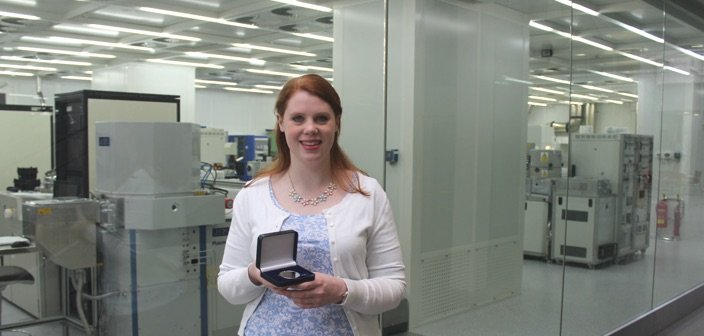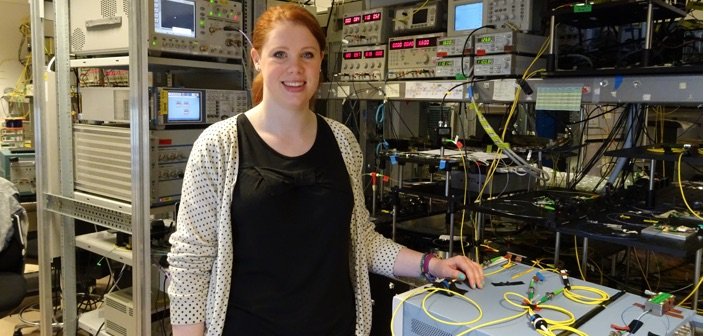Shot of Scientist | Niamh Kavanagh Famelab Winner
For Niamh Kavanagh, a life in science started with a fountain. Not of knowledge, nor even of youth, but a magic fountain.
Niamh was part way through a physics degree at University College Cork and needed to choose a topic for an upcoming presentation. It could be on anything, which is absolutely the worst topic to have to do a presentation on. But then on holiday in Spain with her family, Niamh saw a magic fountain show. She was amazed by the lights which followed the water. Light shouldn’t bend that way! Light is supposed to travel in a straight line. How can it be bending and curving? Suddenly, she knew what she was going to do her presentation on, and her career in photonics began.
In her current role as a photonics research scientist, Niamh looks at improving the capacity of optical cables – the vast network of nerves that connect the internet and telecommunications across the globe. Niamh is a vibrant young woman who clearly loves working in physics. But it didn’t immediately start that way.
“I knew what I didn’t want to be. I didn’t want to be a nurse, I didn’t want to be a teacher, I didn’t want to be a lawyer. So great at knowing what I didn’t want to do!”
Hailing from Wexford, Niamh studied physics for her leaving certificate, but didn’t consider it as an option for university. It was only when her career guidance teacher suggested that she could do a physics degree that she thought she might as well. It sounded like a good foundation degree, one which offered transferable skills, and she probably wouldn’t hate it.
No, she didn’t hate it. Indeed, she loved it.
A physics degree isn’t easy going, however. Niamh admits the course at UCC was quite demanding.
“It was very hard but I really, really liked it. And I was really lucky with the group of other people in my class. We worked together, it was great. So I really loved it.”
Niamh likes to say that she’s lucky, but it’s obvious that she worked hard to get where she is. She hasn’t been afraid to find and pursue opportunities. Of her fountains project, she says she simply walked over to the Tyndall Institute because it was just down the road. It seemed like a good place to find out about optics.
“I approached the photonics systems group in Tyndall about going there to research for the presentation. I went there and I was just so impressed with the labs and the people there and the work that they were doing and they all seemed really excited and so smart. And I thought this would be an awesome place to work.”
That summer, she applied for an internship at Tyndall and wound up spending the next two summers at the Institute. After that, it was a no-brainer to keep pursuing research in photonics and, after successfully winning an Irish Research Council grant, she started her PhD in October 2014.
Niamh’s research:
Optical fibres are made of solid silica glass. Sending data down an optical fibre cable uses a basic principle of physics, that light will travel down the cable by bouncing off the walls. Send it in a basic on/off 1/0 configuration and you’ve got a data stream. Send different colours (wavelengths) and you’ve got several data streams.
Optical fibre works great, for now, but we’ll be hitting capacity crunch soon. One solution to the coming crunch is to use a hollowed cable, one that allows lasers to travel through air on the inside, rather than glass. These new cables are half as lossy and may be able to provide 10 to 100 times more capacity. But – and there’s always a but – they use a different wavelength to current cables. This means that the components doing the work at the transmitting and receiving ends need to be changed.
Niamh’s research looks at finding ways that these different components can work at the new wavelength.
Niamh’s lab is a mass of optical cables, hydraulic benches, amplifiers, modulators, oscilloscopes and lasers. There isn’t a test tube or white lab coat in sight, but there are a lot of different people working on a crazy variety of projects.
“I can’t imagine if I was in a lab, completely isolated on my own,” Niamh says. “I think it would be very difficult, when everything just won’t work, I think it would be very difficult to get through those times. Because there are times when nothing will work, it won’t turn on even. And you’re like, you should be turning on! All the switches are on! It’s nice to have that shared experience of struggling through those times when you feel really stupid.”
It’s hard to believe Niamh could ever feel stupid! In fact, as the Irish winner of FameLab she’s about to head to Cheltenham for the International Championship. FameLab is a competition that sees students and scientists given three minutes to concisely present a topic of their choice.
“It really helps you determine what your main message is. When I had to put my research into a 3 minute talk I had to really sit back and think, what is the point of my research? What is the main aim here? What do I want people to know about?”
To practice, Niamh visited schools to test out her talk. She figured that if secondary school students could understand what she was saying, she would be doing well. But that’s not the only reason she went to schools.

“I would have loved a girl to come in and talk to me about physics when I was in school,” Niamh admits. “I would have been like, yeah! Physics girl!”
I asked Niamh what advice she would give to anyone else thinking about pursuing a career in physics. She pauses before saying, “I always think this sounds condescending, but if you REALLY know the basics of it then it’s just that applied again and again. Sometimes you need to step completely back and remember what the fundamental basics are.”
Niamh doesn’t say it, but I gather that another piece of advice is to embrace every opportunity and pursue what you’re really interested in.
Thinking about that magical fountain that started all this off, I say to Niamh, “But now you know how the magic is done.”
“Exactly,” she says. “And it’s even more magical now.”
Watch Niamh’s winning FameLab presentation on lasers and that volcano that nobody can pronounce:

